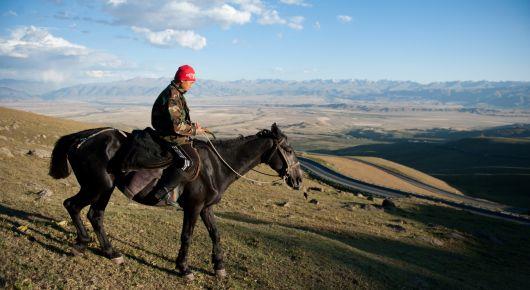Kyrgyzstan receives support from FAO, GCF to achieve carbon sequestration in forests and rangelands

The expansion of pasture areas and use of traditional extensive grazing practices with a growing number of livestock takes its toll on the forest cover of the Kyrgyz Republic. This prohibits the country from increasing carbon sequestration and storage.
At its board meeting on 12–14 November, the Green Climate Fund (GCF) approved USD 50 million in funding (including a USD 30 million grant) to break these trends by introducing an integrated, locally determined ecosystem management approach for rangelands and forest resources.
The GCF grant mechanism is an innovative catalytic element that enhances public–private partnerships promoting climate-related investments by taking a holistic approach.
For the next eight years, the project will increase carbon sequestration in three important ways: climate investments in forests and rangelands will be supported that address the drivers of degradation and emissions via institutional support; the project will develop a participatory ecosystem-based sustainable management of natural resources; and climate-sensitive value chains investments will be encouraged.
“The combination of a mountainous topology and rather dry climate limits the abundance of natural resources in Kyrgyzstan, further pressured by the negative effects of climate change,” noted Dinara Rakhmanova, Assistant FAO Representative to Kyrgyzstan. “Now we aim to provide incentives for communities to preserve and expand forested areas and increase rangelands productivity, as well as to diversify their production in order to increase climate resilience.”
Unsustainable agricultural and forestry practices and climate change are the key reasons for land degradation and soil erosion, and, ultimately, for the degradation of natural resources systems. In the Kyrgyz Republic, 40 percent of agricultural land is seriously degraded and over 85 percent of the total land area is eroded. As the climate continues to change, the seasonal redistribution of rainfall and rising temperatures will increasingly exert direct pressure on forest and grassland ecologies.
To this end, the GCF-funded project will strengthen evidence-based natural resources management governance, green investments to rehabilitate forests and rangelands, and climate-sensitive value chain development.
“The project will enhance carbon storage and support reduction of carbon emissions, as well as facilitate income diversification in rural areas. This will ensure climate adaptive and mitigation-oriented productivity through strengthening natural resources management governance and introducing a process of local integrated rangeland and forestry resource planning built around forest, rangeland, and livestock management practices and related green investments,” said FAO agricultural officer Tania Santivanez. “The expected reductions represent 7.6 percent of the country’s total emissions.”
Another aim is to reduce the dependency of rural communities on pastures and woody resources and improve livelihoods by channelling investments into income diversification, as well as enhanced efficiency and competitiveness for rural women and men.
Ultimately, the experience of this project will serve as a driver for disseminating good practices throughout the country. As a result, national agricultural production will shift from subsistence livestock production that is predominantly unsustainable to a value chain business-oriented economy that is more diversified and climate-sensitive.
14 November 2019, Songdo, Republic of Korea
